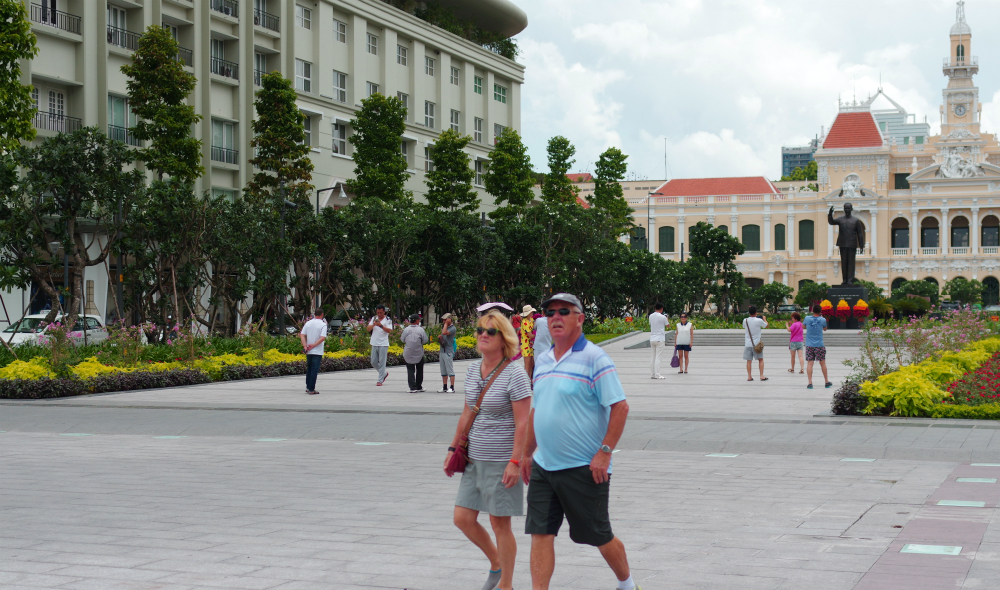Vingroup, one of the leading Vietnamese property developers, on July 2 announced that foreigners and overseas Vietnamese registered to buy 112 apartments at its high-end condo project Vinhomes Central Park in Ho Chi Minh City within two hours.
The bids were placed at two separate launch ceremonies for the project in Hanoi and Ho Chi Minh City, the two biggest cities in Vietnam, on July 1, four days after the realty group informed the public of the events.
A Vingroup source told news website VnEconomy that the ceremonies were attended by more than 400 foreigners and overseas Vietnamese from the U.S., Britain, France, Japan, and South Korea.
The Vietnamese firm started selling the Vinhomes Central Park units right after the new housing law that allows foreigners to own houses and condos in Vietnam took effect on July 1.
One week earlier, Vietnam's Prime Minister Nguyen Tan Dung approved the scrapping of a 49 percent foreign ownership cap across many listed firms, although some sectors will remain restricted.
The approval, coming into effect in September, said foreign caps of 49 percent would still apply to areas where ‘conditions’ were placed on foreign investments, except for sectors governed by separate ownership regulations, such as banking, where total foreign stakes are limited to 30 percent.
Kenneth Atkinson, executive chairman of UK-owned audit and consultancy firm Grant Thornton Vietnam, told Tuoi Tre News on July 3 that the two new regulations may trigger a new inflow of both skillful foreign workforces and capital to the Southeast Asian country.
Previously, doors seemed to be closed for foreign investors who want to invest in attractive shares on the Vietnamese stock market, Atkinson said on the sidelines of a press conference to release the Vietnam Hotel Survey 2015.
But given those two recent moves, the doors are suddenly wide open now, he added.
Vietnam has over 20 world-renowned natural and man-made heritage sites, and considering its diversity in culture and cuisine, the Southeast Asian country has full potential to lure over 20 million international arrivals per year by 2020, Atkinson told Tuoi Tre News.
Le Ky Anh, a trade and economic officer at the EU delegation to Vietnam, told the “Doing Business with the EU and Finland” conference in Ho Chi Minh City on July 3 that the expected inflow of skillful foreign workers and capital after the Vietnam-EU free trade agreement is signed will take the national socio-economic development to a new height.
The trade pact, which is likely to be closed in 2015, will cover not only economic and business matters but also other legal and social aspects that help raise the living standard for Vietnamese workers in particular, and Vietnamese people in general.
As the deal has yet to be reached, Anh, who has a deep insight into its negotiation process, already insisted on no place for unskilled workers from the EU.
“We are expecting to see a new wave of European investment after the trade pact is signed, with only top partners, like CEOs, going to Vietnam to run businesses alongside Vietnamese people in lower positions. There will be no unskilled Europeans traveling to Vietnam for work, as their salaries will be unable to cover their living expenses,” Anh said.
The EU is an economy complementary to Vietnam, which means EU goods, mostly high-tech products and high value-added consumer goods, will not directly compete with Vietnamese counterparts, he said, further explaining that the latter have much lower value added so there will be no harm for Vietnamese enterprises.
The same situation may apply to Vietnam when joining the Washington-led Trans-Pacific Partnership (TPP) trade pact, a proposed regional free trade agreement aimed at eliminating tariffs and lowering non-tariff barriers that is being negotiated by 12 countries throughout the Asia-Pacific region, as both the EU and the U.S. are in the same stage of development: the post-industrialized era.
The negotiating countries, which hope to ink the TPP deal by the end of this year, include Australia, Brunei, Canada, Chile, Japan, Malaysia, Mexico, New Zealand, Peru, Singapore, the United States, and Vietnam, which collectively contribute almost half of global output and over 40 percent of world trade, according to the Office of the United States Trade Representative.
Charles H. Rivkin, Assistant Secretary of State for Economic and Business Affairs, told Tuoi Tre News at a press meeting in Ho Chi Minh City last month that the realization of the TPP later this year will benefit all member countries, especially a small economy like Vietnam.
“The TPP is a high-standard and ambitious treaty that opens new markets for our entrepreneurs, new choices for consumers, sets new standards for workers, including the air we breathe, and [creates] economic means that will build a positive architecture of security throughout the region,” Rivkin added.
Joining the TPP will not only enable Vietnam to integrate into global supply chains, but also allow the country to be ranked among the leading economies in the Asia-Pacific region, he said.
With the materialization of the trade pact, Vietnam's GDP may increase more than 30 percent within 10 years, Rivkin quoted a research by the U.S.-based Peterson Institute for International Economics as saying.
Rivkin’s official visit to Vietnam happened just one month earlier than a historic visit by the chief of the Communist Party of Vietnam to Washington, D.C., which was held ostensibly from July 6 to 10 to celebrate 20 years of normalized diplomatic relations between the two countries.
General Secretary Nguyen Phu Trong’s meeting with U.S. President Obama in the Oval Office on July 7 indicated a new era in Vietnam-U.S. relations, as Washington now regards Hanoi as a key partner in the Asia-Pacific region.
Like us on Facebook or follow us on Twitter to get the latest news about Vietnam!



















































